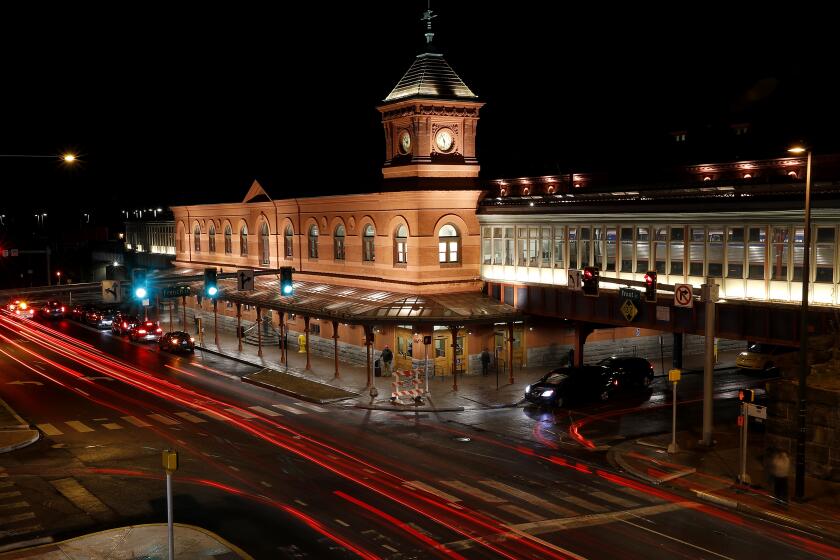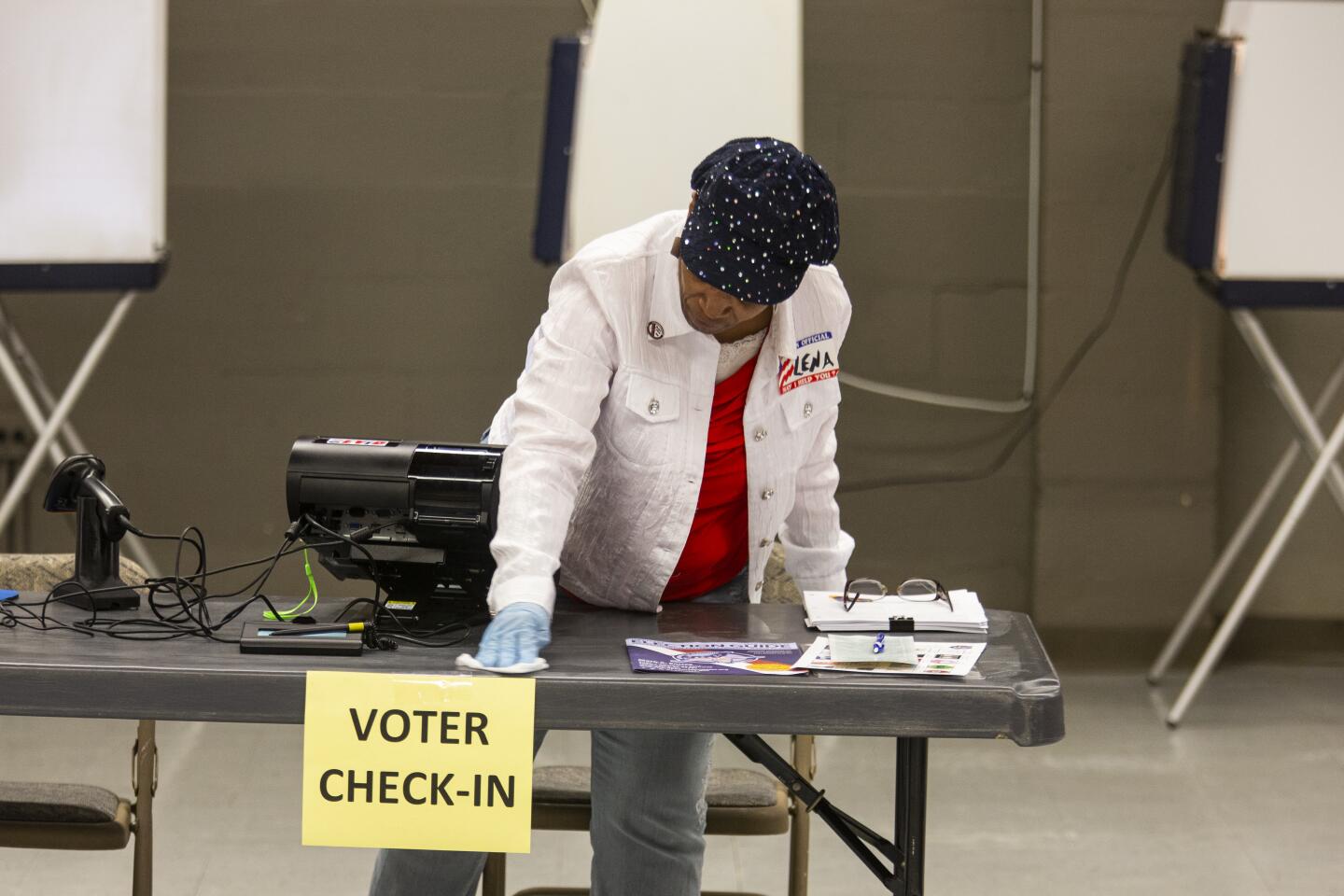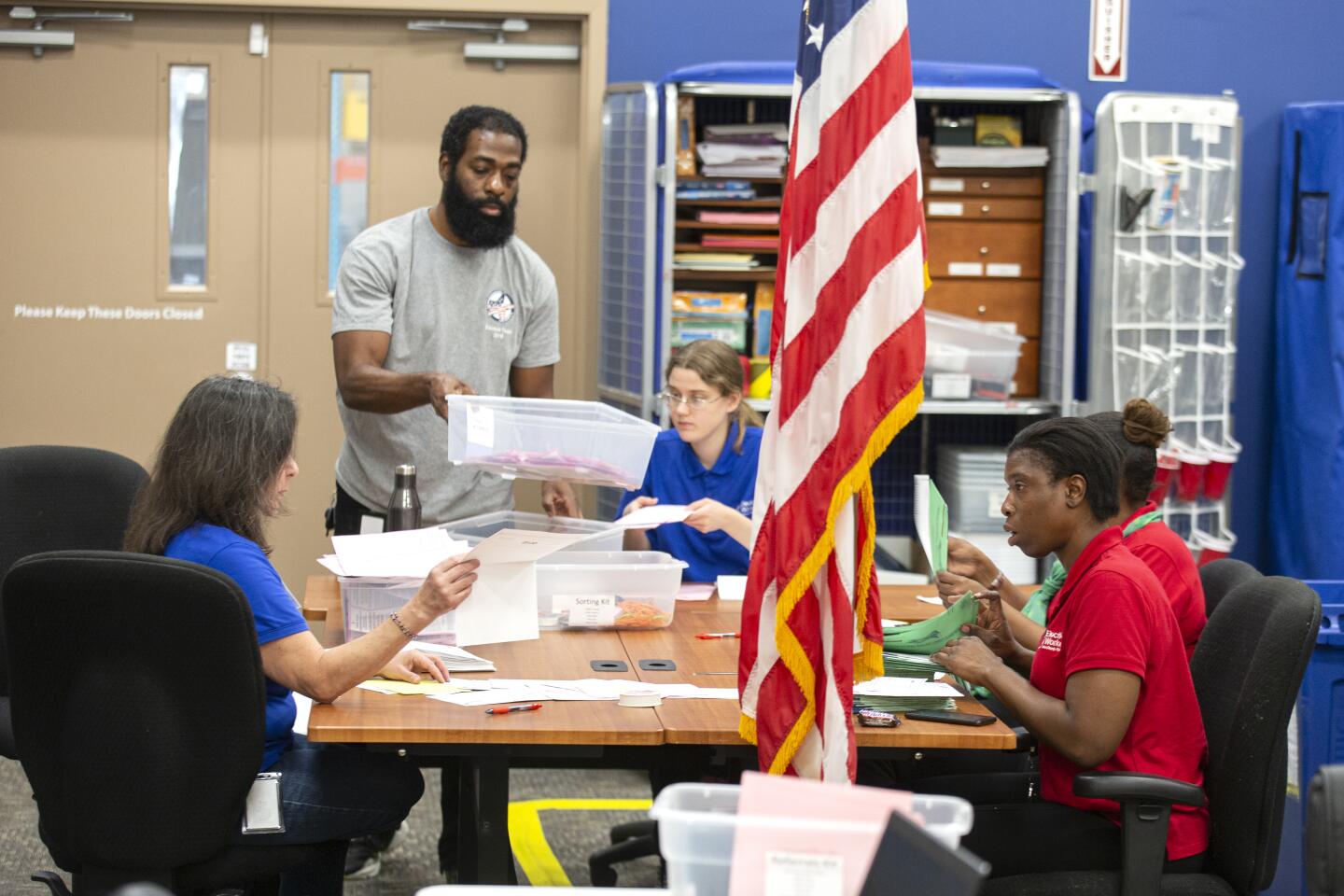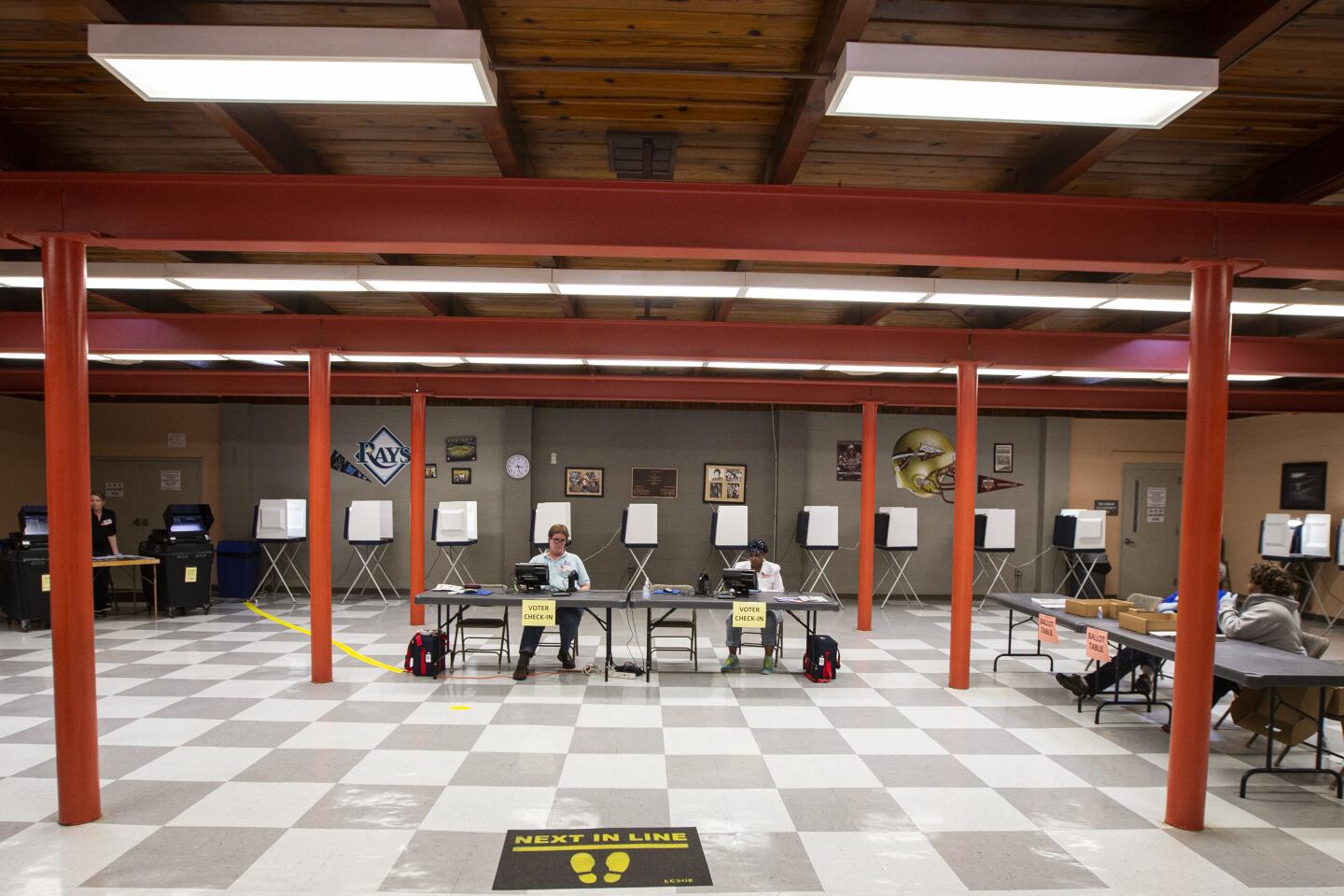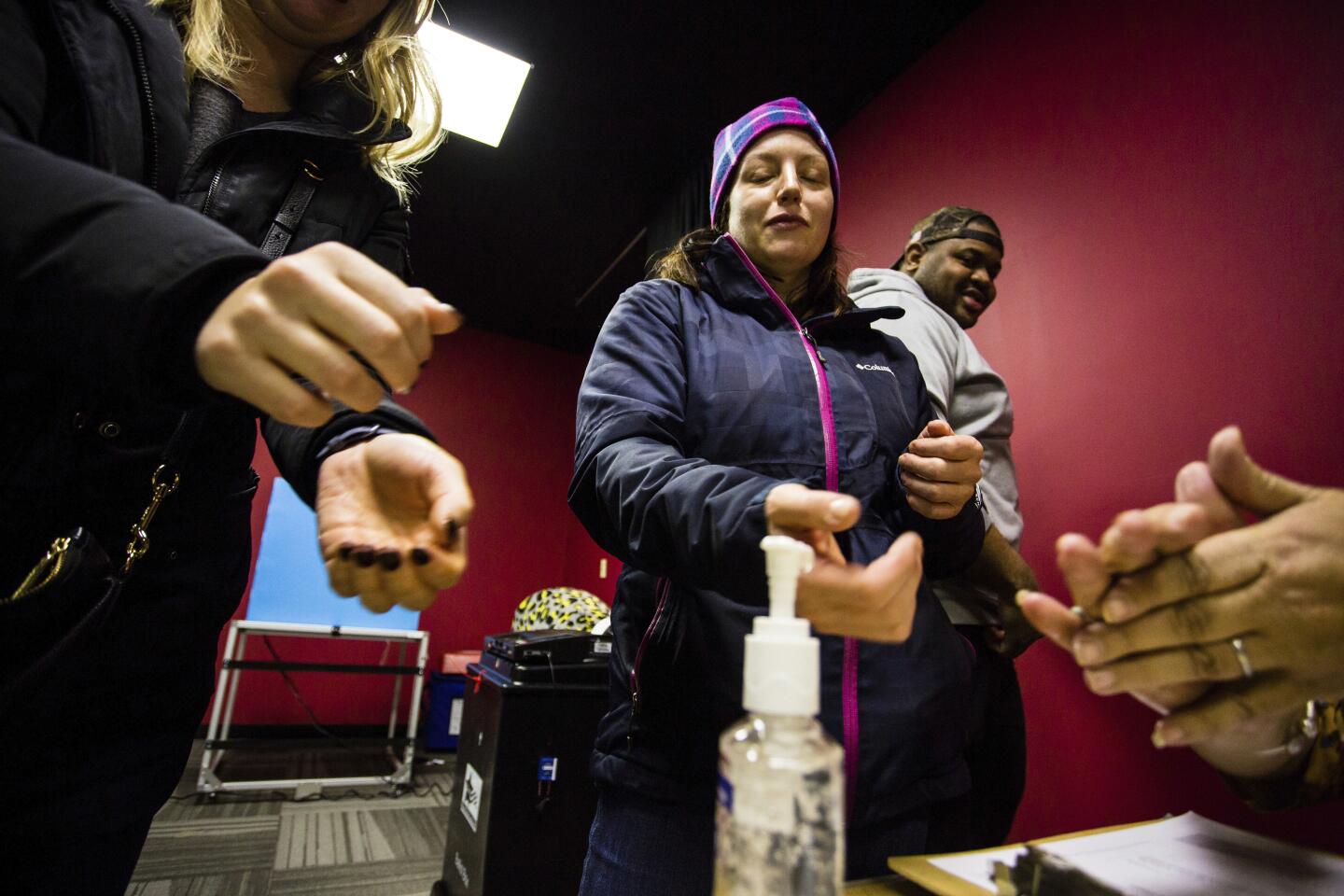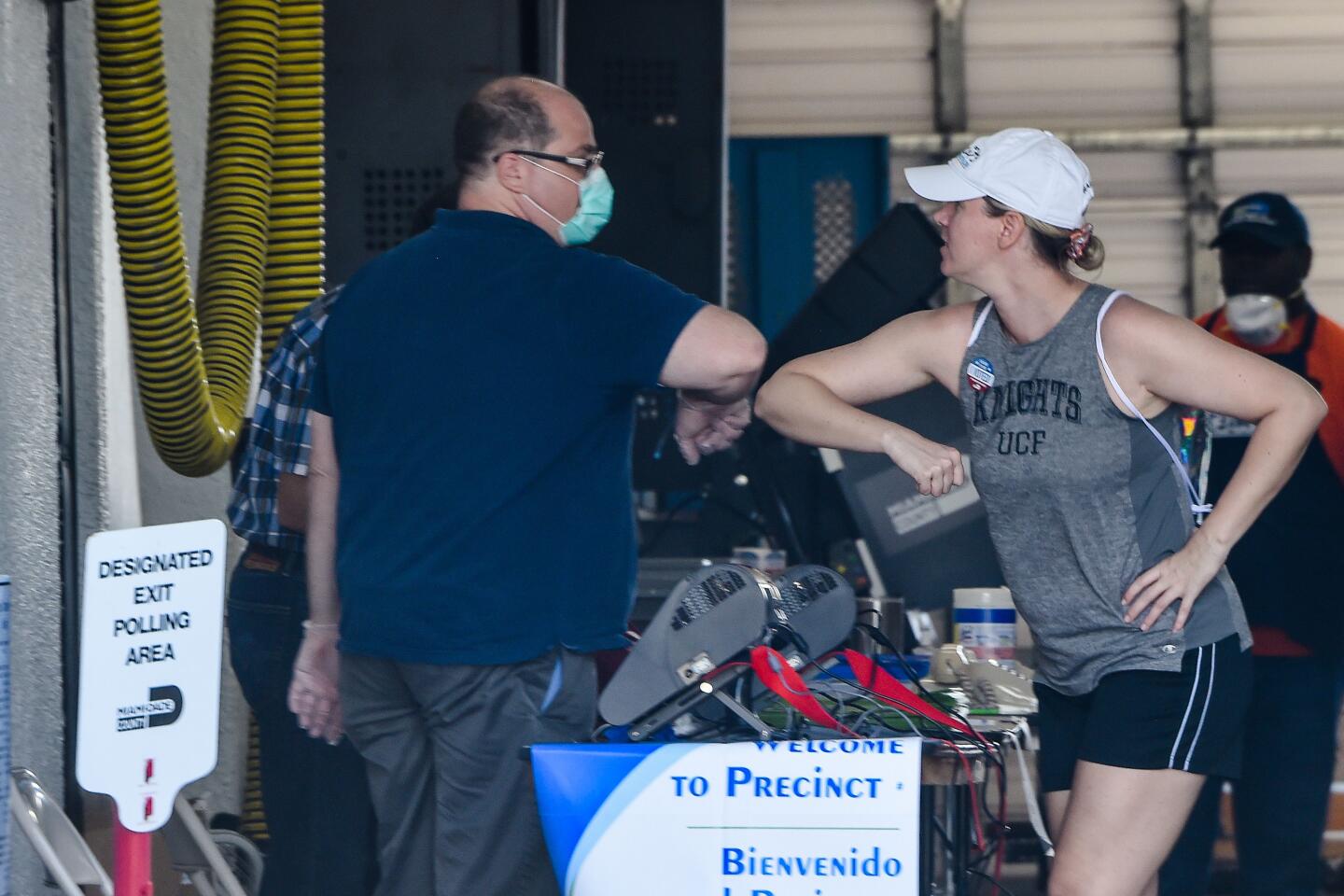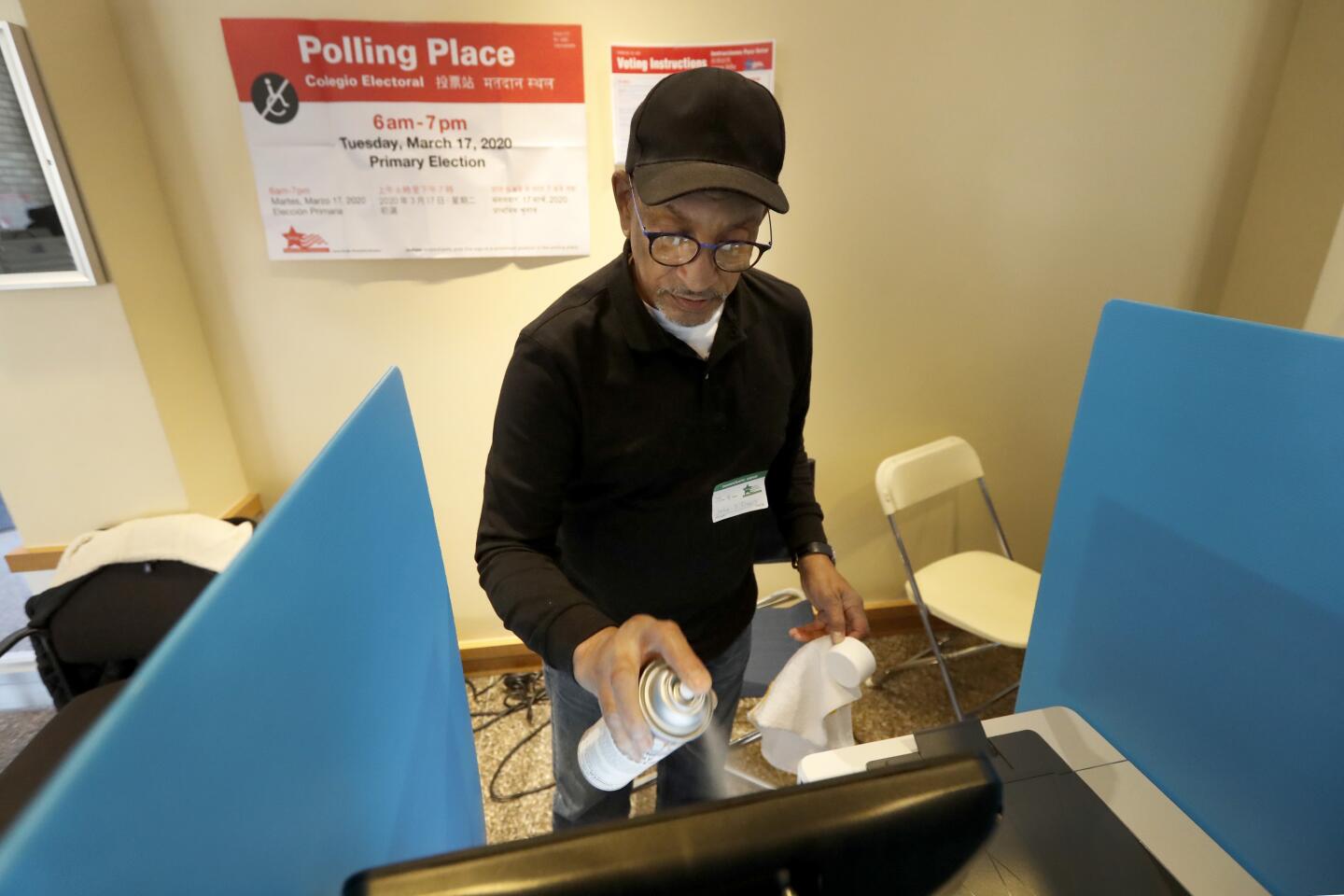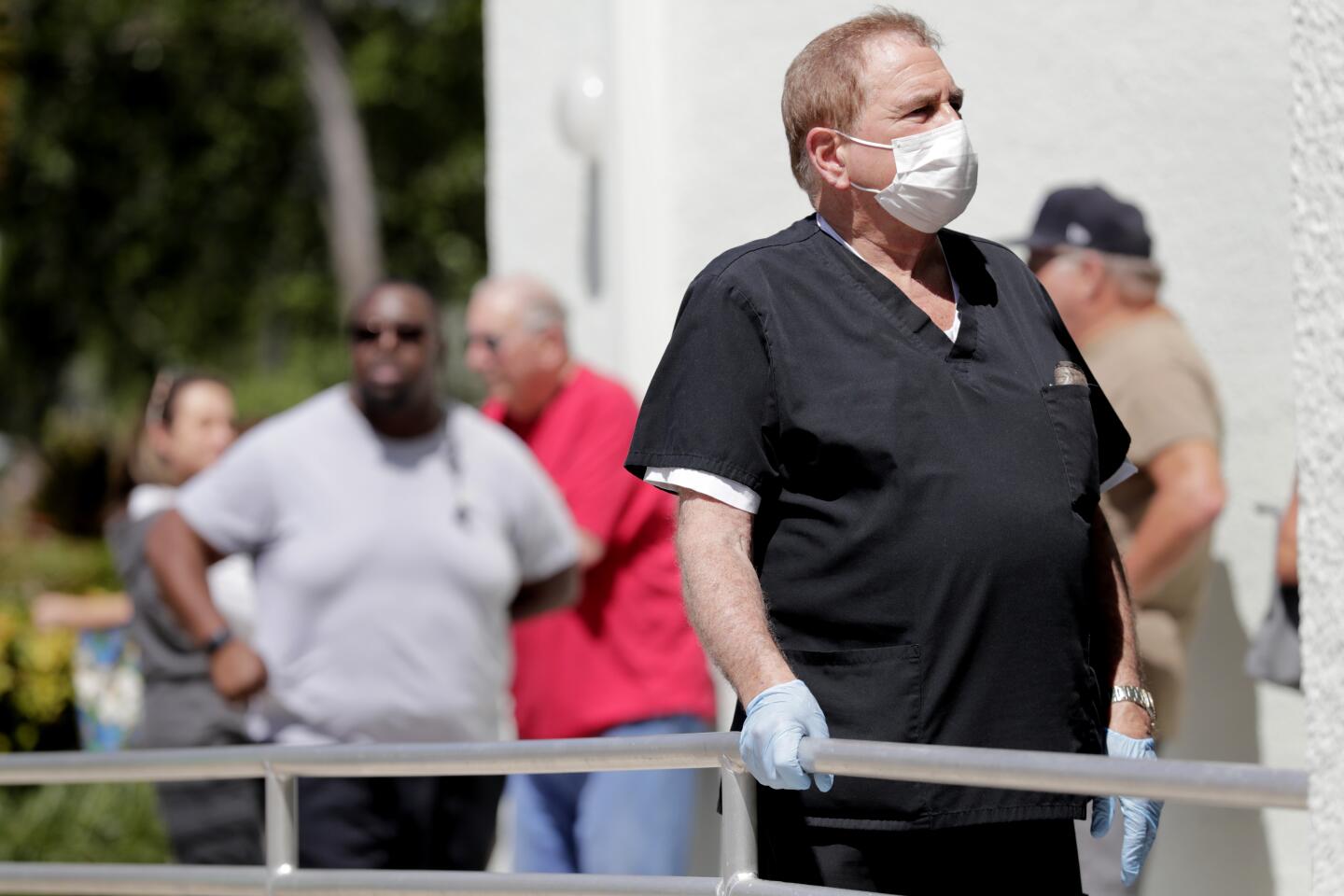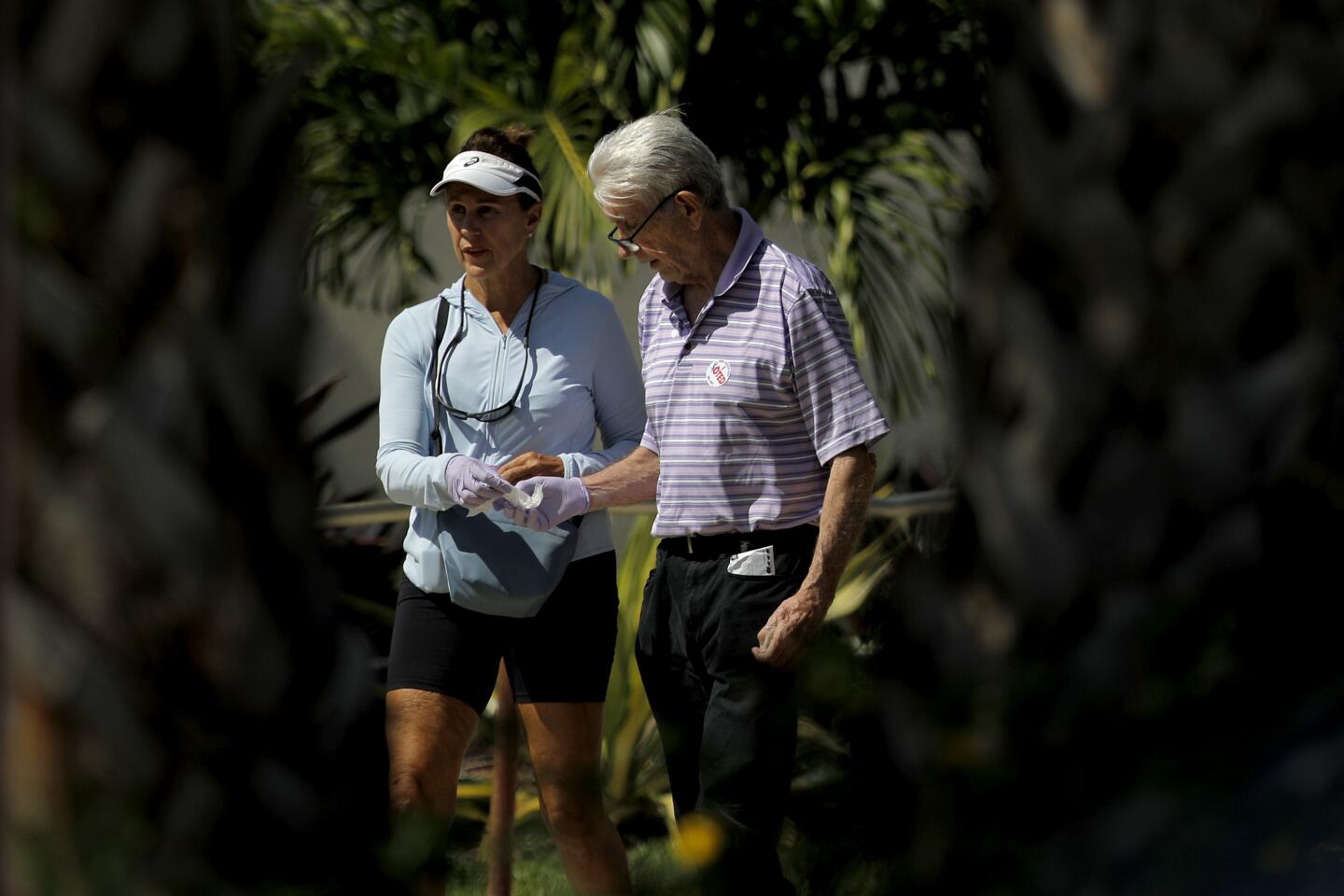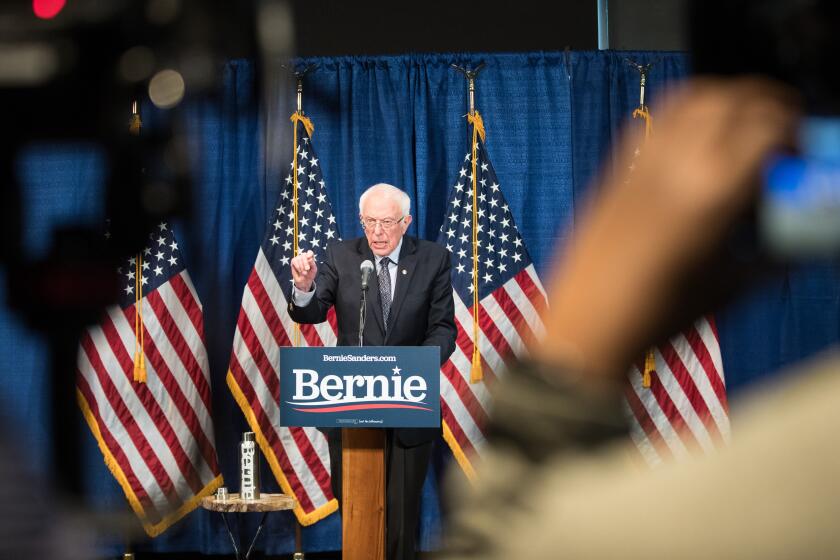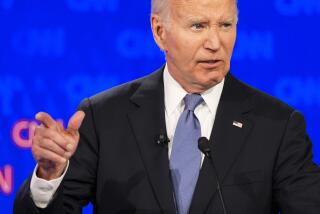Joe Biden sweeps Bernie Sanders in March 17 primaries and widens delegate lead

- Share via
Joe Biden swept the Arizona, Florida and Illinois primaries Tuesday, taking a long stride toward clinching the Democratic nomination on an extraordinary election day shadowed by growing fears of the coronavirus pandemic.
The former vice president prevailed over Bernie Sanders in convincing fashion, forging a now-familiar coalition of party moderates, older and pragmatic voters as well as African Americans, who once more supported Biden in landslide numbers.
It takes 1,991 delegates to win the nomination at the party’s summer convention, and Biden’s powerful showing Tuesday pushed him past 1,100, lengthening his already sizable lead over Sanders and leaving Vermont’s senator with only the faintest hopes of a comeback.
He immediately faced renewed calls to step aside in the interest of party unity, the urgency heightened by the nation’s growing sense of crisis.
The threat posed by the novel coronavirus, which has touched every American, provided a frightening backdrop for an election day unlike any other.
Ohio postponed its primary hours before the polls were set to open after the state’s health director, acting at the behest of Gov. Mike DeWine, declared a public health emergency.
Where voting was underway, election official worked to balance safety with business as usual.
In Illinois, Cook County Clerk Karen Yarbrough urged poll workers to use painter’s tape to mark the floor in 6-foot increments, so those in line would stand far enough apart to avoid spreading the virus. “This picture can save lives,” she said in how-to instructions posted on Twitter.
Still, there were reports of missing disinfecting supplies, shuttered voting centers that were supposed to be open and other mishaps across the three states.
Joe Biden’s hometown of Wilmington is known for its small size and relationship-based politics. But just as in national politics, backlash has been brewing against the status quo.
The crisis atmosphere seemed to benefit Biden, who has based much of his candidacy on his decades of Washington experience, including eight years in the White House as vice president under Barack Obama. In all three primaries, voters overwhelmingly said they trusted Biden more than Sanders to handle a major crisis, according to exit poll interviews.
Claiming victory Tuesday night, Biden appeared solo and struck a somber tone, devoting the bulk of his brief remarks to the pandemic. He praised those on the front lines fighting the virus and, forsaking the usual harsh partisan rhetoric, called for Americans to pull together and help one another.
Speaking from his home in Wilmington, Del., with a pair of furled American flags as his backdrop, Biden once more extended his hand to supporters of Sanders, praising their tenacity, and vowing to work on shared interests: expanding the availability of healthcare, addressing income inequality, fighting climate change.
Turning in particular to younger voters, Sanders’ strongest supporters and those most resistant to his candidacy, Biden said, “I hear you. I know what’s at stake. I know what we have to do. Our goal as a campaign and my goal as a candidate for president is to unify this party, and then to unify the nation.”
For the second week in a row, after another dispiriting performance, Sanders did not address the results in public. Before the polls closed, he spoke via livestream from his campaign office in Washington, where he, too, focused on the worsening coronavirus outbreak.
“In this moment of crisis, it is imperative that we stand together,” Sanders said.
Of the day’s political contests, Biden posted the most important victory in Florida, a perennial November battleground, where his commanding win surpassed the showing last month in South Carolina that launched his campaign’s resurrection.
The outcome was not unexpected. Among other things, Sanders antagonized the state’s large Cuban population with favorable comments about some of the late dictator Fidel Castro’s programs.
Still, Biden’s victory was striking in its magnitude. He rolled up winning margins among black and white voters, men and women, and those with and without college degrees; he even narrowly bested Sanders among the senator’s usual base of self-described “very liberal” voters.
(Exit polls conducted by Edison Research showed Latinos making up about a quarter of Florida’s electorate, but did not break down the vote between candidates.)
Biden staked a similarly broad-based victory in Illinois and one nearly as sweeping in Arizona, where, in a breakthrough, he ran even with Sanders among Latino voters, who have been among the senator’s biggest supporters.
Perhaps most encouraging for Democrats, turnout in Arizona as well as Florida surpassed 2016 levels, notwithstanding the pandemic, a sign that partisan enthusiasm — which helped the party take control of the House in 2018 — remains high.
Setting aside the primary results, the coronavirus has introduced a sudden element of uncertainty into the Democratic race, which seemed largely settled after Biden roared back with his South Carolina win on Feb. 29 and a string of Super Tuesday victories on March 3.
It is not so much mathematics, which weigh heavily in Biden’s favor, but rather the mechanics: With tens of millions of American locked down at home, several states have delayed their upcoming contests, leaving the candidates and their campaigns in an unprecedented limbo.
After Tuesday, no voting is scheduled until Puerto Rico’s March 29 primary — and officials there are seeking a delay — so it was unclear how the contest will proceed. (Ohio allowed mail balloting to continue, with plans to open its polls and tally the results June 2.)
The chairman of the Democratic National Committee, Tom Perez, urged states that had yet to hold primaries to expand their vote-by-mail programs, absentee balloting and polling station hours to avoid further disruptions.
“The right to vote is the foundation of our democracy, and we must do everything we can to protect and expand that right instead of bringing our democratic process to a halt,” Perez said in a written statement.
The balloting Tuesday was marked by confusion and uncertainties caused by the country’s unprecedented health crisis.
Some poll workers failed to show up in Florida, leaving election officials scrambling to accommodate voters with no place to register their preference. Makeshift polling places had to be set up in all three states, as nursing homes and other locations that typically serve as polling places were closed off to avoid large gatherings.
Bernie Sanders is losing the electability argument in the Democratic primary, but he asserts he is winning the battle of ideas. On healthcare, college tuition and championing working-class issues, he has shaped the policy contours of this Democratic race.
The two candidates took differing stands on whether the elections should proceed under such extraordinary circumstances — a reflection, perhaps, of Sanders’ desire to prolong the contest and Biden’s eagerness to wrap it up.
“We are not doing traditional [get out the vote] outreach in states holding primary contests today,” Mike Casca, a Sanders spokesman, said after the candidate suggested delaying the election. “We are making clear to voters that we believe going to the polls amid the coronavirus outbreak is a personal decision and we respect whichever choice they make.”
The Biden campaign saw no reason for delay.
“The American people are resilient and strong,” deputy campaign manager Kate Bedingfield wrote in an election day memo. “We have maintained our democracy through war and peace, economic downturn and prosperity, and in previous moments of public health crisis.... We are confident that we can meet that same challenge today and continue to uphold the core functions and values of our democracy.”
Biden entered the day with a considerable lead in the delegate count and pulled even further ahead Tuesday night, 1,147 to 861 for Sanders, according to the Associated Press. While not mathematically insurmountable, that gap is formidable, given rules that award delegates on a proportional rather than winner-take-all basis.
To overtake Biden, Sanders would have to start winning one landslide victory after another, a reversal of fortune even more dramatic than Biden’s never-before-seen turnaround.
Times staff writers Michael Finnegan, Melissa Gomez and Melanie Mason contributed to this report.
More to Read
Get the L.A. Times Politics newsletter
Deeply reported insights into legislation, politics and policy from Sacramento, Washington and beyond. In your inbox twice per week.
You may occasionally receive promotional content from the Los Angeles Times.

